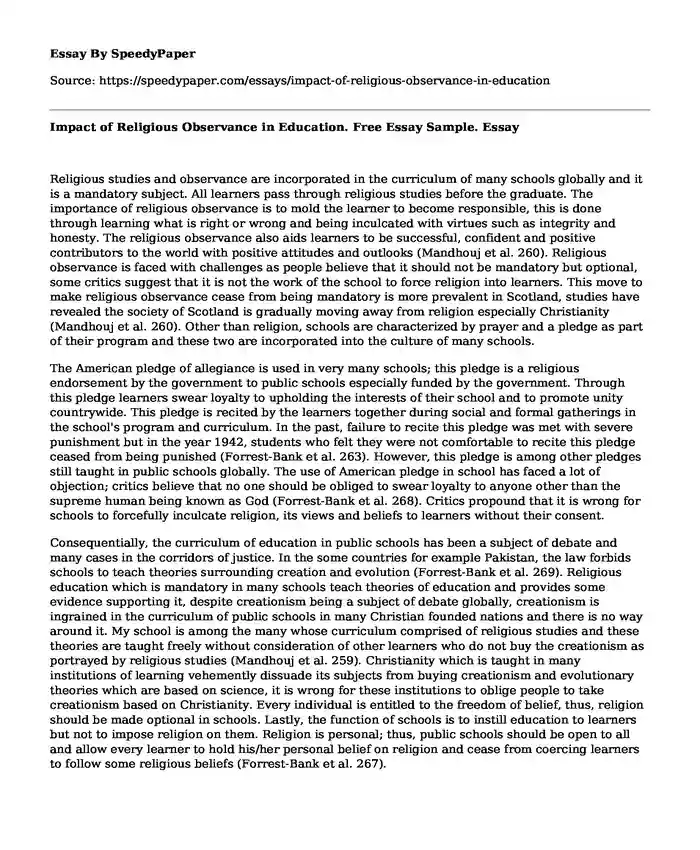Religious studies and observance are incorporated in the curriculum of many schools globally and it is a mandatory subject. All learners pass through religious studies before the graduate. The importance of religious observance is to mold the learner to become responsible, this is done through learning what is right or wrong and being inculcated with virtues such as integrity and honesty. The religious observance also aids learners to be successful, confident and positive contributors to the world with positive attitudes and outlooks (Mandhouj et al. 260). Religious observance is faced with challenges as people believe that it should not be mandatory but optional, some critics suggest that it is not the work of the school to force religion into learners. This move to make religious observance cease from being mandatory is more prevalent in Scotland, studies have revealed the society of Scotland is gradually moving away from religion especially Christianity (Mandhouj et al. 260). Other than religion, schools are characterized by prayer and a pledge as part of their program and these two are incorporated into the culture of many schools.
The American pledge of allegiance is used in very many schools; this pledge is a religious endorsement by the government to public schools especially funded by the government. Through this pledge learners swear loyalty to upholding the interests of their school and to promote unity countrywide. This pledge is recited by the learners together during social and formal gatherings in the school's program and curriculum. In the past, failure to recite this pledge was met with severe punishment but in the year 1942, students who felt they were not comfortable to recite this pledge ceased from being punished (Forrest-Bank et al. 263). However, this pledge is among other pledges still taught in public schools globally. The use of American pledge in school has faced a lot of objection; critics believe that no one should be obliged to swear loyalty to anyone other than the supreme human being known as God (Forrest-Bank et al. 268). Critics propound that it is wrong for schools to forcefully inculcate religion, its views and beliefs to learners without their consent.
Consequentially, the curriculum of education in public schools has been a subject of debate and many cases in the corridors of justice. In the some countries for example Pakistan, the law forbids schools to teach theories surrounding creation and evolution (Forrest-Bank et al. 269). Religious education which is mandatory in many schools teach theories of education and provides some evidence supporting it, despite creationism being a subject of debate globally, creationism is ingrained in the curriculum of public schools in many Christian founded nations and there is no way around it. My school is among the many whose curriculum comprised of religious studies and these theories are taught freely without consideration of other learners who do not buy the creationism as portrayed by religious studies (Mandhouj et al. 259). Christianity which is taught in many institutions of learning vehemently dissuade its subjects from buying creationism and evolutionary theories which are based on science, it is wrong for these institutions to oblige people to take creationism based on Christianity. Every individual is entitled to the freedom of belief, thus, religion should be made optional in schools. Lastly, the function of schools is to instill education to learners but not to impose religion on them. Religion is personal; thus, public schools should be open to all and allow every learner to hold his/her personal belief on religion and cease from coercing learners to follow some religious beliefs (Forrest-Bank et al. 267).
Works cited
Mandhouj, Olfa, and Philippe Huguelet. "Why It Is Important to Talk About Religion." Understanding Suicide. Springer International Publishing, 2016. 257-265.
Forrest-Bank, Shandra S., and David R. Dupper. "A qualitative study of coping with religious minority status in public schools." Children and Youth Services Review 61 (2016): 261-270.
Cite this page
Impact of Religious Observance in Education. Free Essay Sample.. (2019, Sep 16). Retrieved from https://speedypaper.com/essays/impact-of-religious-observance-in-education
Request Removal
If you are the original author of this essay and no longer wish to have it published on the SpeedyPaper website, please click below to request its removal:
- Knowledge Management and Change Management at Nestle. Free Essay.
- Argumentative Essay Example on Obesity and Junk Food
- Essay Sample about Supervised Machine Learning Approach
- Free Essay on the Theme of Malcom X Legacy
- Essay Sample on Qualitative Research Case Study: Sample and Instrument
- My Disneyworld Experience. Essay Example
- Paper Sample. Advantages of Using Comparative Statements for Financial Analysis
Popular categories





